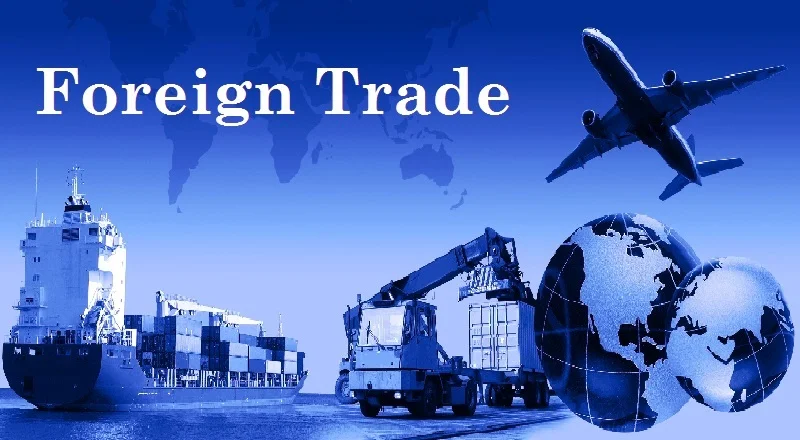Foreign trade increases the total size of the market, raises the level
of output, boosts the owners' incomes, leads to an increased learning-by-doing,
and stimulates economic growth.
How Important is Foreign Trade
to Your Country?
Countries
trade with each other is an important factor in driving GDP growth, providing
employment, raising living standards and enabling consumers to enjoy a wider
range of goods and services.
Trading
Human activities are numerous and varied and are constantly increasing
with increasing knowledge and technical progress. However, there are some
activities that remain constant with a change in their forms such as industry,
agriculture, and trade.
Trading is basically the exchange of goods and services between two
entities.
Trade forms the core of all economic societies and financial activities
and it controls the wheels of progress in any society and allows wealth to be
created.
In finance, a trader is a person who buys and sells financial
instruments such as bonds, stocks, commodities, derivatives, and mutual funds.
On the basis of the geographical location of buyers and sellers, trade
can be broadly classified into two categories (1) Internal trade; and (2)
External trade.
Internal Trade, also known as Domestic Trade, is the buying and selling of goods and services within the boundaries of a country.
External trade, also
known as Foreign trade or International trade, is the buying and selling of goods
and services between two or more countries.
Foreign trade refers to the exchange of capital, goods, and services
between different countries and nations.
Foreign trade is the most important trade in terms of spreading and
exchanging goods and services across international borders or territories. Some
commodities do not exist in some regions, so those who live there need to buy
these commodities from other regions in which they are available.
Why International Trade is necessary for
economic growth?
Sometimes, importing a commodity is more efficient than manufacturing it
locally, so foreign trade contributes to providing goods to some countries at a
lower cost.
International trade increases the total size of the market, raises the
level of output, boosts the owners' incomes, leads to an increased
learning-by-doing, and stimulates economic growth.
The basic reasons for the emergence of international trade can be
summarized as per the following points:
- Production costs differ from one country to another.
- Reduced dependence on the local market.
- Improving per capita income in the countries.
- Increasing efficiency and productivity.
- Realizing profits that help develop the country.
- Getting rid of excess products, which can sometimes be burdensome.
- The differences in demand and supply.
- The difference in the ability of countries to produce from one country to another.
- The differences in technology and resource endowments.
What is the Importance of Foreign Trade in
Economic Growth?
Foreign trade plays an important role in the economy of each individual
country. The importance of foreign trade can be explained according to the
following points:
⇒Foreign trade helps connect different countries with each other, which
leads to closer relations between different countries of the globe. Thus, it
creates a friendly atmosphere to avoid wars and conflicts and promotes world
peace as such countries try to maintain friendly relations among them.
⇒Foreign trade works to transfer the technological development that is taking place in one country to another, sometimes in exchange for specific wages.
International trade gives consumers and countries the opportunity to be
exposed to the latest technologies not available in their own countries, or
which would be more expensive domestically.
⇒Foreign trade ensures the production of high-quality and standardized
goods because foreign trade is highly competitive in order to maintain and
increase the demand for goods, and the exporting countries have to maintain the
quality of the goods. Foreign trade helps to keep the demand and supply
position stable, which in turn stabilizes the prices.
⇒Foreign trade helps achieve local market balances and increase national
income, in the event, that the proportion of exports increases and the
proportion of imports decreases.
⇒Foreign trade spreads the concept of globalization, as the world has
become a small village, and perhaps e-commerce has clearly and significantly
contributed in this area. Sometimes it is easier and more affordable to buy a
commodity from a specific country than from the neighborhood in which the
individual lives.
⇒Foreign trade provides various consumer products to the local consumer
and makes them available to him with multiple options, so he is able to choose
the most appropriate because he is no longer limited to specific products.
⇒Nations share customs and traditions greatly. Some of the commodities
used by some countries constitute traditional heritage for them and the
prevalence of these commodities in other countries and regions works to share
this heritage with the rest of the earth's population.
⇒Foreign trade provides many job opportunities that yield
good, or even excellent, income in some cases. For example, the logistics
business expands greatly as a result of the increase in foreign trade rates,
which creates many different job opportunities.
⇒Some countries have abundant natural resources, so they
should export raw materials and import finished goods from developed countries
with a skilled workforce. Thus foreign trade benefits all countries and leads
to the division of labor and specialization at the world level.

